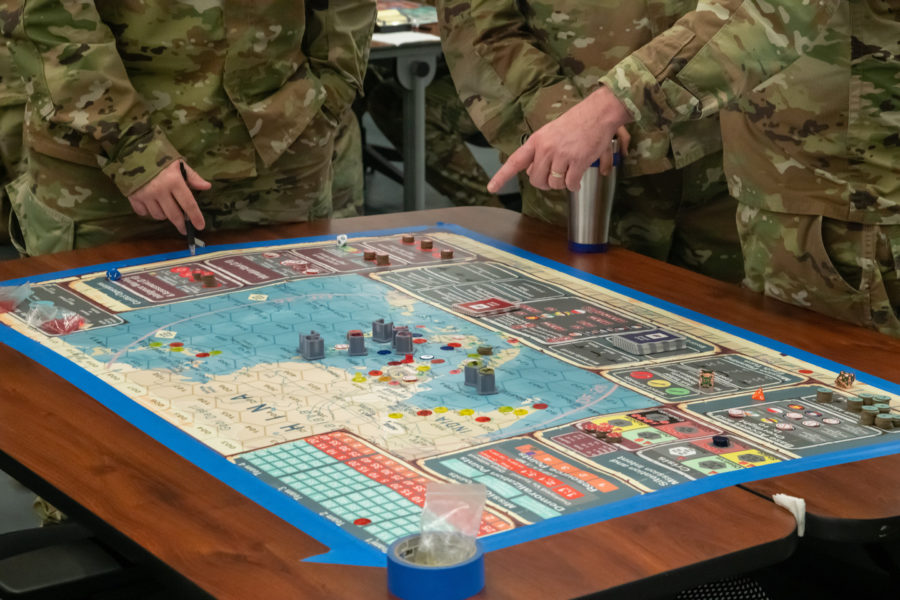The U.S. military relies on wargames to help inform its strategy, tactics, and requirements. But a new report from the Government Accountability Office sees some flaws, including Department of Defense efforts that are chronically stovepiped.
“GAO found that there are barriers to accessing wargame data, information on upcoming wargames is not shared, and the services have not developed standard education and qualifications for wargamers,” the report, released April 24, stated.
The report drew on the interviews with DOD officials, in addition to the oversight body’s research and analysis. After reviewing the critique, the Pentagon agreed with the GAO’s recommendations.
The DOD began a push to increase and improve its wargaming in 2015 under then deputy secretary of defense Robert Work, who wrote in a memo at the time that the ability of the U.S. military to conduct wargames had “atrophied.”
Today, a broad array of commands and organizations conduct simulations internally or in collaborations with outside entities. The Pentagon’s Office of Net Assessment and the Cost Assessment and Program Evaluation office, the Joint Staff, services, combatant commands, and other organizations all conduct wargames for their own strategic, tactical, or educational purposes.
Yet the Pentagon does not have a full understanding of the scope of the myriad wargaming efforts, according to the GAO. Compounding the problem, there are numerous obstacles to sharing information across the department on what wargames are concluding and how they are being conducted.
“In the absence of a department-wide data management approach, barriers to accessing wargame reports and other information remain—results are left completely unrecorded or unshared within organizational stovepipes,” the GAO said. “As a result, wargame sponsors or designers do not have the benefit of consulting a comprehensive database of wargames prior to pursuing their own, losing opportunities to learn from others and leverage earlier work.”
To remedy the problem, GAO said the Pentagon needs an office to monitor and account for the military’s wargames. The department should also “identify a lead organization to create and maintain a common operational picture or master calendar for wargames,” the report states. And those conducting the wargames should be required to provide that information.
Some security experts who have participated in wargames agreed there should be more transparency within the DOD, especially when the conclusions are used to drive important decision-making.
“If we’re going to hear about tidbits from games, it would be good if the games themselves had some explanation,” Eric Heginbotham of MIT’s Center for International Studies told Air & Space Forces Magazine. “So there’s a public component to this. But even within DOD, there’s a big problem in terms of just collecting and making available even within the community the results—everything from game structure to rules to outcomes and lessons learned.”
One possible solution would be to broaden the mandate of a relatively new DOD unit, the Analysis Working Group—the AWG was created in 2021 to guide the Pentagon’s analytic capabilities, including wargames.
One GAO recommendation in particular proposed the Secretary of Defense “should ensure the Analysis Working Group develops and implements a department-wide approach for effectively sharing wargame data that, at a minimum, establishes requirements or standards for reporting wargame data and addresses the fragmentation of data across multiple systems.”
Some wargame designers also said the DOD should understand the limits of what can be learned from wargames, which are ultimately human endeavors subject to practical constraints, such as participants’ time, resources, subject matter knowledge, and individual biases.
Becca Wasser, the head of the Center for a New American Security’s Gaming Lab, said that the Defense Department should be cautious in relying on wargames alone to advocate for particular operational concepts or capabilities.
“Part of this is also always pairing game results with additional research,” she said. “It is a human-centric tool of analysis,” Wasser added. “What one participant might see as the takeaways and lessons learned are different than what another participant sees.”
Retired Lt. Gen. David A. Deptula, dean of the Mitchell Institute for Aerospace Studies, welcomed additional scrutiny of wargaming.
“An evaluation of just how wargaming and simulations are done is certainly warranted because many people place a lot of emphasis on their outcome,” he said.
“They should be used to inform, guide, and familiarize the participants with respect to a particular situation,” Deptula added. “But we have to be very careful about drawing conclusions, particularly from single wargame events, because there are so many assumptions that go into a particular wargame, even the most sophisticated and complex.”
